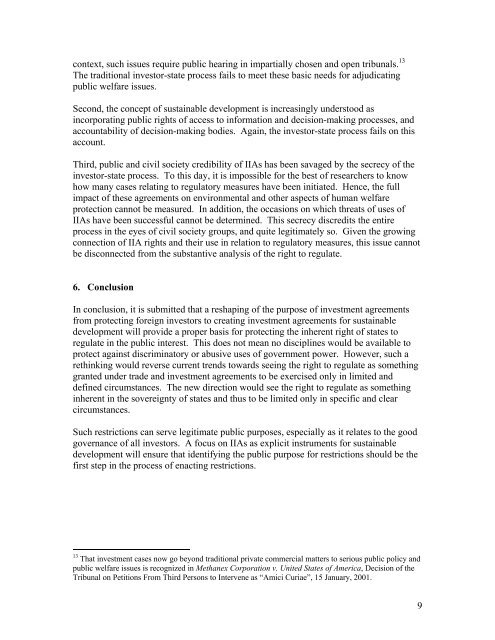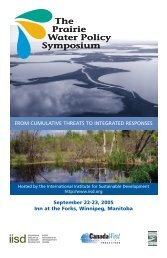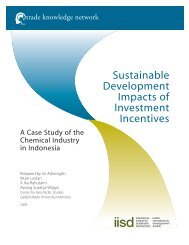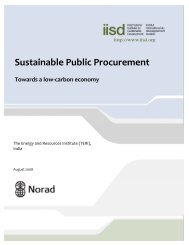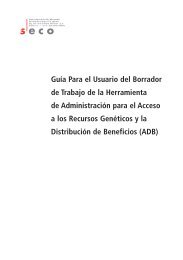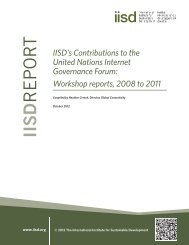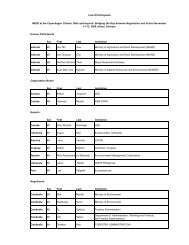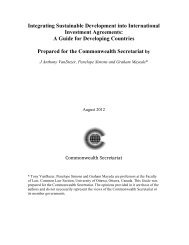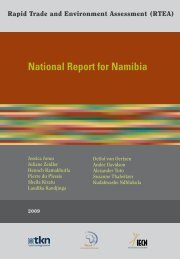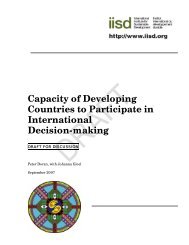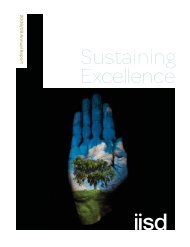The Right of States to Regulate and International Investment Law
The Right of States to Regulate and International Investment Law
The Right of States to Regulate and International Investment Law
Create successful ePaper yourself
Turn your PDF publications into a flip-book with our unique Google optimized e-Paper software.
context, such issues require public hearing in impartially chosen <strong>and</strong> open tribunals. 13<br />
<strong>The</strong> traditional inves<strong>to</strong>r-state process fails <strong>to</strong> meet these basic needs for adjudicating<br />
public welfare issues.<br />
Second, the concept <strong>of</strong> sustainable development is increasingly unders<strong>to</strong>od as<br />
incorporating public rights <strong>of</strong> access <strong>to</strong> information <strong>and</strong> decision-making processes, <strong>and</strong><br />
accountability <strong>of</strong> decision-making bodies. Again, the inves<strong>to</strong>r-state process fails on this<br />
account.<br />
Third, public <strong>and</strong> civil society credibility <strong>of</strong> IIAs has been savaged by the secrecy <strong>of</strong> the<br />
inves<strong>to</strong>r-state process. To this day, it is impossible for the best <strong>of</strong> researchers <strong>to</strong> know<br />
how many cases relating <strong>to</strong> regula<strong>to</strong>ry measures have been initiated. Hence, the full<br />
impact <strong>of</strong> these agreements on environmental <strong>and</strong> other aspects <strong>of</strong> human welfare<br />
protection cannot be measured. In addition, the occasions on which threats <strong>of</strong> uses <strong>of</strong><br />
IIAs have been successful cannot be determined. This secrecy discredits the entire<br />
process in the eyes <strong>of</strong> civil society groups, <strong>and</strong> quite legitimately so. Given the growing<br />
connection <strong>of</strong> IIA rights <strong>and</strong> their use in relation <strong>to</strong> regula<strong>to</strong>ry measures, this issue cannot<br />
be disconnected from the substantive analysis <strong>of</strong> the right <strong>to</strong> regulate.<br />
6. Conclusion<br />
In conclusion, it is submitted that a reshaping <strong>of</strong> the purpose <strong>of</strong> investment agreements<br />
from protecting foreign inves<strong>to</strong>rs <strong>to</strong> creating investment agreements for sustainable<br />
development will provide a proper basis for protecting the inherent right <strong>of</strong> states <strong>to</strong><br />
regulate in the public interest. This does not mean no disciplines would be available <strong>to</strong><br />
protect against discrimina<strong>to</strong>ry or abusive uses <strong>of</strong> government power. However, such a<br />
rethinking would reverse current trends <strong>to</strong>wards seeing the right <strong>to</strong> regulate as something<br />
granted under trade <strong>and</strong> investment agreements <strong>to</strong> be exercised only in limited <strong>and</strong><br />
defined circumstances. <strong>The</strong> new direction would see the right <strong>to</strong> regulate as something<br />
inherent in the sovereignty <strong>of</strong> states <strong>and</strong> thus <strong>to</strong> be limited only in specific <strong>and</strong> clear<br />
circumstances.<br />
Such restrictions can serve legitimate public purposes, especially as it relates <strong>to</strong> the good<br />
governance <strong>of</strong> all inves<strong>to</strong>rs. A focus on IIAs as explicit instruments for sustainable<br />
development will ensure that identifying the public purpose for restrictions should be the<br />
first step in the process <strong>of</strong> enacting restrictions.<br />
13 That investment cases now go beyond traditional private commercial matters <strong>to</strong> serious public policy <strong>and</strong><br />
public welfare issues is recognized in Methanex Corporation v. United <strong>States</strong> <strong>of</strong> America, Decision <strong>of</strong> the<br />
Tribunal on Petitions From Third Persons <strong>to</strong> Intervene as “Amici Curiae”, 15 January, 2001.<br />
9


